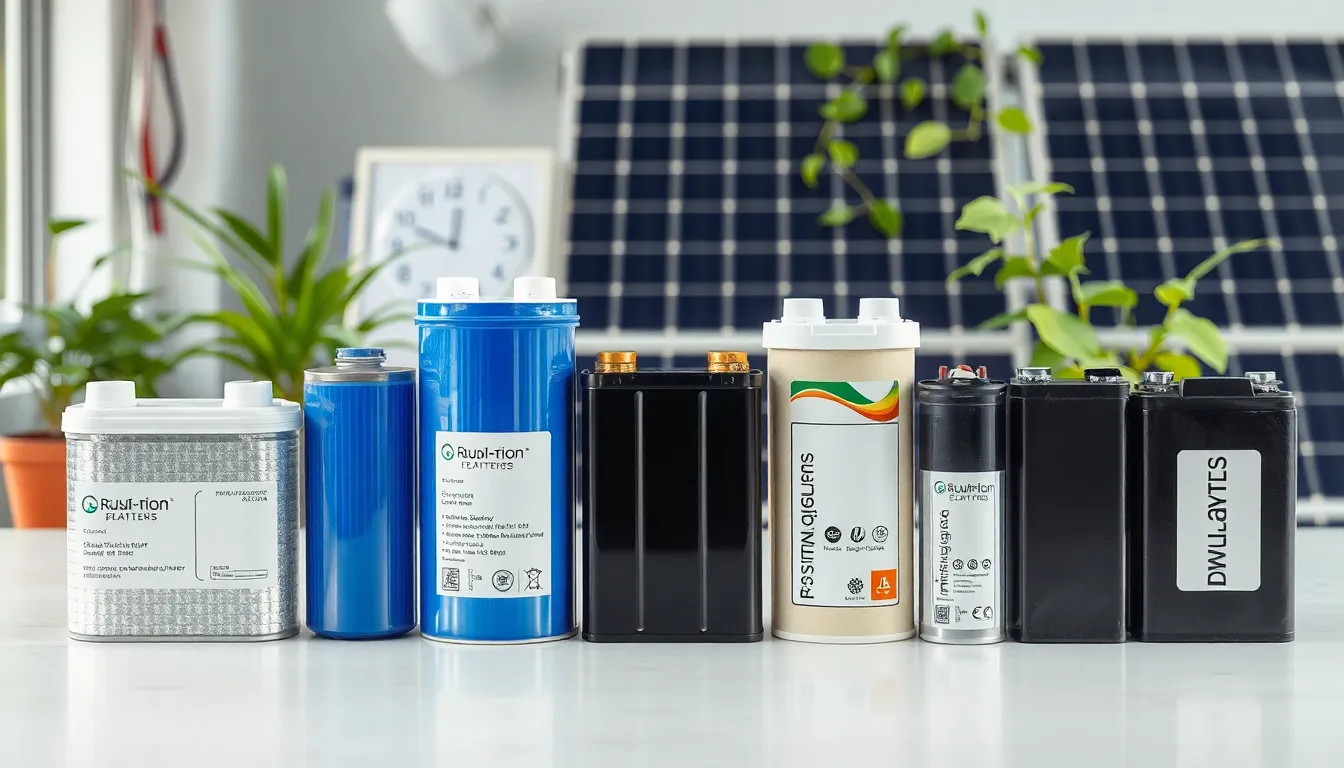Table of Contents
ToggleIn a world where our gadgets seem to have a love affair with power outlets, sustainable battery technology is stepping in to save the day—and the planet. Imagine a battery that not only lasts longer but also doesn’t leave a trail of environmental destruction in its wake. It’s like finding a unicorn in a field of horses, and it’s about time we all got on board this eco-friendly ride.
Overview of Sustainable Battery Technology
Sustainable battery technology represents a critical advancement in energy storage solutions. These batteries aim to reduce the negative environmental impacts associated with traditional options. Different materials, including lithium-sulfur and solid-state variants, demonstrate significant potential due to their efficiency and reduced ecological footprint.
Innovative designs contribute to longer life cycles and enhanced performance. Research indicates that lithium-sulfur batteries can achieve energy densities of 500 Wh/kg, significantly surpassing conventional lithium-ion batteries. Moreover, solid-state batteries offer improved safety by eliminating volatile liquid electrolytes.
The production processes of sustainable batteries also emphasize the use of ethically sourced materials. Various manufacturers are shifting to sustainable mining practices, ensuring minimal disruption to ecosystems. Life cycle assessments of these technologies highlight reductions in carbon emissions compared to standard battery production methods.
Importantly, recycling programs have started to integrate sustainable practices. Such initiatives aim to reclaim valuable materials from used batteries, thus reducing reliance on new raw materials. This approach not only conserves resources but also provides economic incentives through recovered materials.
Investment in research and development continues to drive advancements in this field. Government grants and private sector funding prioritize green technologies, fostering innovation. As sustainable battery technology evolves, it promises to play a vital role in transitioning to renewable energy systems.
Types of Sustainable Battery Technologies

Sustainable battery technologies encompass various innovative approaches that enhance energy storage while reducing environmental impact.
Lithium-Ion Alternatives
Lithium-sulfur batteries represent a promising alternative to traditional lithium-ion batteries. They achieve energy densities of 500 Wh/kg, significantly surpassing conventional options. Additionally, sodium-ion batteries offer a sustainable solution, utilizing abundant sodium instead of scarce lithium. These alternatives reduce reliance on limited resources, promoting sustainability. Cobalt-free options are also emerging, minimizing ethical concerns linked to mining. Researchers are continually exploring diverse materials and chemistries that optimize performance while enhancing recyclability. Such advancements lead to safer, more efficient energy storage solutions.
Organic Batteries
Organic batteries utilize carbon-based materials, presenting a greener option for energy storage. These batteries rely on organic molecules, making them biodegradable and less harmful to the environment. Researchers focus on creating high-capacity organic electrodes, which can improve energy density significantly. Moreover, their production typically involves fewer toxic materials, decreasing environmental impact. Enhanced performance in organic batteries could challenge traditional technologies in efficiency and lifespan. Ongoing innovations aim to scale up manufacturing processes, ensuring commercial viability and affordability in the market.
Solid-State Batteries
Solid-state batteries provide a significant leap forward in technology and safety. Their design eliminates liquid electrolytes, reducing flammability risks associated with conventional batteries. These batteries employ solid electrolytes, enhancing energy density and longevity. With potential energy densities upwards of 300 Wh/kg, they promise greater efficiency in energy storage. Manufacturers also note improved charging speeds compared to traditional lithium-ion batteries. Research continues to refine materials and production processes, aiming for mass adoption. Such advancements position solid-state batteries as a key player in the transition toward sustainable energy solutions.
Benefits of Sustainable Battery Technology
Sustainable battery technology offers significant advantages across various dimensions, primarily focusing on environmental and economic benefits.
Environmental Impact
Sustainable battery technology significantly reduces ecological harm. Traditional batteries contribute to pollution and waste, while sustainable alternatives utilize safer materials and are often fully recyclable. For instance, lithium-sulfur batteries not only feature enhanced energy densities but also minimize resource depletion. Organic batteries provide a biodegradable option, decreasing toxic emissions associated with production. Responsible sourcing of raw materials further supports environmental conservation initiatives. Transitioning to these greener technologies directly supports the fight against climate change by lowering carbon footprints.
Economic Advantages
Sustainable battery technology creates new economic opportunities. Cost-effective production methods emerge from efficient material sourcing and recycling processes. By investing in sustainable mining practices, companies can cut expenses tied to raw materials while reducing dependence on finite resources. Additionally, innovative battery designs drive advancements in energy storage that lower overall energy costs. The expansion of recycling programs not only conserves valuable materials but also generates revenue for industries involved in reclaiming them. These economic incentives position companies to benefit from adopting sustainable practices in the battery sector.
Current Research and Innovations
Research in sustainable battery technology rapidly evolves, leading to significant breakthroughs. Innovations in this field aim to enhance performance, safety, and environmental compatibility.
Emerging Technologies
New technologies like sodium-ion and lithium-sulfur batteries capture attention for their potential. Sodium-ion batteries reduce reliance on lithium, making them an appealing alternative. Energy densities for lithium-sulfur batteries reach 500 Wh/kg, surpassing traditional lithium-ion options. Solid-state batteries utilize solid electrolytes to improve safety and efficiency, minimizing risks of leakage and enhancing charge times. Organic batteries gain traction due to their biodegradable materials, presenting a lower environmental footprint. These advancements reflect ongoing efforts to create effective and sustainable energy storage solutions.
Industry Collaborations
Collaborations between companies and research institutions play a critical role in advancing sustainable battery technology. Organizations are investing in joint research projects to share knowledge and resources. Partnerships focus on developing ethical sourcing practices for battery materials, ensuring compliance with sustainability standards. Industry leaders are also pooling funding for recycling initiatives aimed at reclaiming valuable materials from used batteries. Such efforts help drive innovations that lower production costs and enhance battery performance. Together, these collaborative actions support the shift towards a greener battery ecosystem.
Challenges and Limitations
Sustainable battery technology faces several significant challenges. Resource availability ranks high among these obstacles.
Resource Availability
Accessing raw materials poses a major issue for sustainable battery production. Lithium-sulfur and sodium-ion batteries depend on rare earth elements and specific minerals. The limited availability of these resources can drive up costs and hinder scalability. Ethical mining practices often overlap with sustainability, complicating resource extraction. Suppliers risk depleting local ecosystems without proper management, creating ecological concerns. Companies must innovate to source materials responsibly while ensuring long-term availability.
Recycling and Disposal Issues
Recycling processes for sustainable batteries present unique challenges. Limitations in current recycling technology hinder effective recovery of materials. Many battery components are difficult to separate, decreasing overall efficiency. While advances exist, further innovation is crucial to streamline these processes. Disposal and recycling regulations vary across regions, complicating compliance for manufacturers. Uncertainties surrounding recycling capabilities may deter companies from fully committing to sustainable practices. Emphasizing effective recycling systems is vital for minimizing waste and maximizing resource recovery.
Sustainable battery technology represents a transformative shift in energy storage solutions. By prioritizing eco-friendly materials and ethical practices, it not only addresses environmental concerns but also opens doors to new economic opportunities. The advancements in lithium-sulfur and solid-state batteries showcase the potential for greater efficiency and performance.
As research continues to evolve, the focus on recycling and responsible sourcing will be crucial for overcoming existing challenges. The growing collaboration between industries and research institutions is essential for driving these innovations forward. Embracing sustainable battery technology is not just a choice; it’s a necessary step toward a cleaner and more sustainable future.







